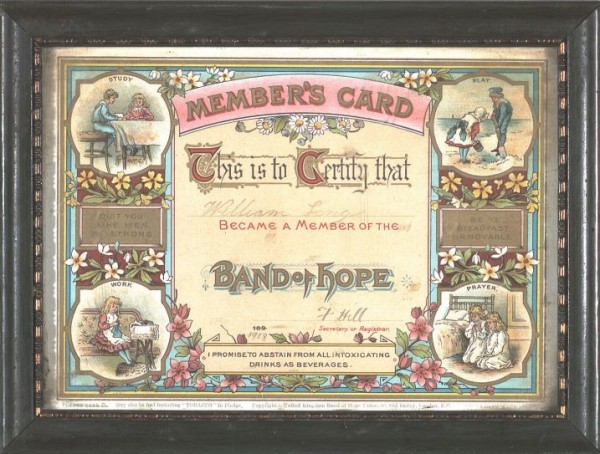‘Better to have a loaf on the table than a loaf in the Pub’
The Band of Hope was formed in England in 1847, with a more formal organisation set up in 1855. It was seen by many as a way to develop self-reliance in working men who could use temperance as a means to self-improvement by renouncing alcohol. It was a non-denominational movement, with branches set up by both Protestant and Catholic communities.
It came to Australia in the 1850s and spread rapidly through the state. In East Melbourne, meetings were held fortnightly, each meeting combining temperance with light entertainment, as this excerpt shows:
‘At the fortnightly meeting of the East Melbourne Congregational Band of Hope held on Tuesday evening, the Rev. Jesse Mayo presided. An illustrated address by Miss Hodgkinson on Drinking, Smoking and Swearing was much appreciated. The singing of temperance songs by members followed.’
One temperance song was this, though I’ll only quote verses 3 and 4:
The Band of Hope
To the crowds that group
In the drunkard’s gloomy way
Can afford them light
That will guide them right
For it shines with celestial ray
The Band of Hope
From the hangman’s rope
It will many a murderer save.
And lengthen the life
Of the suffering wife
Who looks for an early grave.
We can laugh at these sentiments now, but in the latter half of the 19th century and the beginning of the 20th, the Band of Hope organisation and meetings had a powerful effect, with 190 branches in Victoria by 1927. Evening meetings included recitations, lectures, prayers and songs. Children as young as six were wooed with ‘Temperance medals, handsomely illuminated Pledge cards and an assortment of new Recitations’ to forgo alcohol. The Pledge cards read ‘ I, the undersigned, do agree that I will not use intoxicating liquors as a beverage’. In NSW in the pre 1st World War period, State school children in Grades 4,5 and 6 took annual Health and Temperance Knowledge tests provided by the Methodist Band of Hope Societies. With the advent of war, the tests were dropped.
Over the years, the Band of Hope lost followers. In 1953, it was still in existence, but no longer a powerful influence, with The Methodist of 4 July of calling it ‘a largely forgotten organisation’. However, its early influence can be seen in the Temperance Hall at 174 Russell Street (demolished in 1963), the Coffee Palaces of the 1880s, including the very grand Federal Coffee Palace on the corner of Collins and King Streets, demolished in 1973, in the 6 o’clock closing of hotels adopted by all states, and in the ‘dry areas’ of Melbourne where the sales of liquor were prohibited.
This article first appeared in the Inner City News, August 2023

